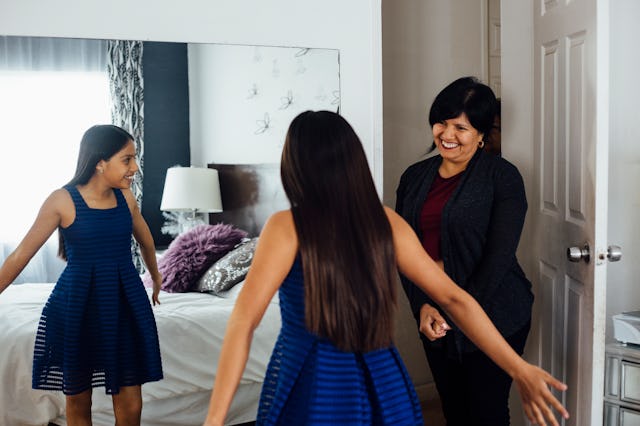All The Things I Wish I Knew When I Was A Pre-Teen
And what I'm teaching my daughter.

The other day my tween and I were watching something on YouTube, and the video cut to a clip from Mean Girls — the one where Regina George’s mom informs all the other girls that she’s not a regular mom, she’s a cool mom. I giggled a little and sighed, reflecting back on the early 2000s.
My tween’s curious voice pulled me back to reality when she started asking about the movie. In an attempt to turn the film’s PG-13 plot into something relatable for my daughter, we talked about the themes around beauty and imposter syndrome and, of course, all the complex, messy, and glorious feelings of growing up.
It’s been a minute since I’ve been a tween. (As you can probably tell from the fact I just used the expression “It’s been a minute.”) But back in the early 2000s, when I went through that phase, being a tween was totally different. Advice on our physical health came from J-14 and Cosmo (when Mom wasn’t looking). Productivity was glorified; anxiety was brushed off as being sensitive. Mental health wasn’t talked about.
Things have changed so much in the last 20 years that I find myself wondering what my life would be like if I knew then what I know now. But I’m aiming for a happier, healthier, better-adjusted generation this time around and teaching my tween to take care of her health as a whole — physical, mental, and emotional.
Physical Health
Growing up, we had Kate Moss telling us that thin was in. The aesthetics have changed — I point to the Kar-Jenner clan — but the idea that some bodies are more beautiful and more worthy than others still hasn’t changed.
Fortunately, we’ve also seen the rise of body acceptance, which offers our tweens a tool to fight back against that message. Body acceptance isn’t just about accepting your shape and size, it’s about accepting everything about your body and appreciating it for everything it can do.
It’s important to remember this isn’t just about weight or shape, either. With puberty comes a whole lot of other physical changes, like body hair, different body odors, periods, and growth spurts. Don’t assume that health class covers it all — it’s important to be proactive. Because when we don’t hold space for these conversations, shame tends to creep its way in, and there is nothing shameful about your tween’s changing body.
Mental Health
Here’s the thing about mental health: everyone has it, and it’s important not to neglect it. Teach your teens basic self-care skills now — things like slowing down to avoid burnout — before it’s too late.
Knowing all the challenges life will throw at them as they grow up, it’s natural to want to shield them. But helping them learn how to cope and making healthy habits second nature will help them now and in the future.
For example, do they want to join every sport and activity that their friends are doing? Of course, but taking on too much at once will burn them out, and they won’t have any fun doing it. The same goes for feeling overwhelmed with school work. I’m not saying you shouldn’t study, pay attention in class, and always try your best, but it’s important to remind your tween that even if they don’t do well on a test or a project, the world will keep turning. Perspective matters.
Emotional Health
No matter how young they are, tweens have really big feelings. Not only are they dealing with changes in their own immediate space, but other life events take emotional bandwidth to process. Like how sad it is when your best friend moves away. Or how terrifying it can feel joining a new class now that you’re in middle school. And, of course, everyone remembers what it feels like to learn your first crush isn’t crushing on you the same way.
As adults, we think back on those days with a sigh and a smile, knowing what we do now. But when your tween is going through it, there isn’t much you can say or do to change how they feel. What you can do is empower them to be aware of and process their feelings.
Does your daughter feel some kind of way about how a boy talked to her? Make sure she understands the importance of boundaries. Or maybe your son feels uncomfortable participating in some of that “boys will be boys” activity. Reassuring him that it’s okay to set boundaries with his friends can make a world of difference.
The ways I’m teaching my tween to take care of all aspects of her health might not make me a cool mom, but it will make me feel like the best parent I can be by giving her the tools to help her now and in the future.